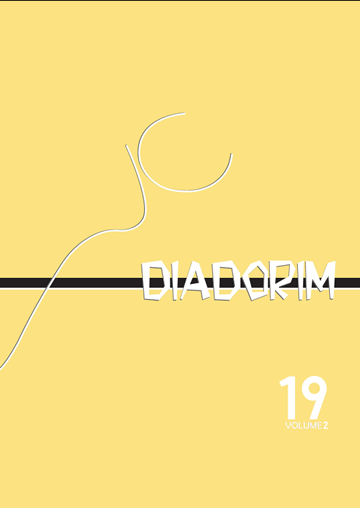A Apreensão de Aspectos Morfossintáticos que Iluminam os Sentidos do Gênero Poema
DOI:
https://doi.org/10.35520/diadorim.2017.v19n2a9959Palabras clave:
Ensino de gramática, Morfossintaxe, Gênero poema,Resumen
O objetivo deste texto é apresentar breves justificativas sobre a importância do ensino da gramática, sobretudo no que diz respeito aos aspectos morfossintáticos dos enunciados presentes no gênero poema. Sabe-se que o ensino de gramática tem sido um dos temas mais controversos entre os professores de língua portuguesa. Em geral, os que são contrários acreditam que aprender os aspectos gramaticais da língua não acrescenta novas habilidades linguísticas ao aluno. Outros creem que é necessário ensinar os conteúdos gramaticais, pois entendem que tal aprendizagem é necessária, já que o domínio da norma padrão é uma exigência social. Neste texto, será apresentada a argumentação de Vigotski quanto à utilidade do ensino de gramática não só para desenvolver as habilidades linguísticas, mas também para corroborar o desenvolvimento global do aluno. Para tanto, primeiramente serão abordadas algumas concepções vigotskianas imprescindíveis à devida compreensão dessa discussão, tais como o papel da escola para o desenvolvimento dos conceitos científicos e a tomada de consciência, que permite, no caso do ensino da língua, o manejo consciente e arbitrário das regras gramaticais concernentes à norma padrão. Além disso, no âmbito deste trabalho, essa tomada de consciência é o fator que leva o aluno a expandir a leitura do gênero poema, possibilitando-lhe a apreensão de expedientes poéticos que passariam despercebidos sem a análise dos aspectos morfossintáticos. Em seguida, serão oferecidos exemplos de análises morfossintáticas no gênero poema, de acordo com as abordagens teóricas de Bechara, Henriques, Abreu, Neves, entre outros, que ilustram como esse conhecimento gramatical pode ampliar e ressignificar os sentidos do texto. Por se tratar do gênero poema, os exemplos propostos serão mais adequados a alunos do Ensino Médio.
Descargas
Citas
ABREU, Antônio Suárez. Gramática mínima para o domínio da língua padrão. Cotia, SP: Ateliê Editorial, 2003.
ANDRADE, Carlos Drummond de. Congresso internacional do medo. Reunião: 10 livros de poesia. 8. ed. Rio de Janeiro: J. Olympio, 1977. p. 49.
ANDRADE, Carlos Drummond de. Memória. Reunião: 10 livros de poesia. 8. ed. Rio de Janeiro: J. Olympio, 1977. p. 168.
ANDRADE, Mário de. Moça linda bem tratada. Lira paulistana. Poesias completas. São Paulo: Círculo do Livro, s.d., p. 352.
BECHARA, Evanildo. Ensino de gramática. Opressão? Liberdade? 12. ed. São Paulo: Ática, 2003.
BECHARA, Evanildo. Lições de Português pela análise sintática. 16. ed. Rio de Janeiro: Editora Lucerna, 2001.
BECHARA, Evanildo. Moderna Gramática Portuguesa. 37. ed. Rio de Janeiro: Editora Lucerna, 2000.
DANIELS, Harry. Vygotsky e a pedagogia. São Paulo: Edições Loyola, 2003.
FERREIRA, Aurélio Buarque de Holanda. Novo Dicionário Aurélio eletrônico versão6.0. 4. ed. Curitiba: Positivo, 2009.
GARCIA, Othon M. Comunicação em prosa moderna: aprenda a escrever, aprendendo a pensar . 26. ed. Rio de Janeiro : Editora FGV, 2007.
HENRIQUES, Claudio Cezar. Sintaxe: estudos descritivos da frase para o texto. Rio de Janeiro: Elsevier, 2008.
LIPMAN, Matthew. O pensar na educação. Tradução de Ann Mary Fighiera Perpétuo. Petrópolis: Vozes, 1995.
MARCUSCHI, LUIZ Antônio. Compreensão de texto: algumas reflexões. In: DIONÍSIO, Angela Paiva; BEZERRA, Maria Auxiliadora (Org.). O livro didático de português, múltiplos olhares. Rio de janeiro, Lucerna, 2001. p. 46-59.
NEVES, Maria Helena de Moura. Que gramática estudar na escola? Norma e uso na Língua Portuguesa. São Paulo: Contexto. 2003a.
NEVES, Maria Helena de Moura. Guia de uso do Português: confrontando regras e usos. São Paulo: Editora UNESP, 2003b.
PESSOA, Fernando. O moinho que mói trigo. Quadras ao Gosto Popular. [Introdução e fixação do texto por Georg Rudolf Lind e Jacinto do Prado Coelho]. Lisboa: editorial Ática, 1965.
PESSOA, Fernando. Obra poética. Organização, introdução e notas de Maria Aliete Galhoz. 4. ed. Rio de Janeiro: Companhia José Aguilar Editora, 1972. p. 229-230.
SILVA, Elisabeth Ramos da. A utilidade da teoria gramatical na produção de textos formais escritos. Estudos Linguísticos, São Paulo, n. XXXIV, p. 316-321, jul. 2005. Disponível em: <http://www.gel.org.br/estudoslinguisticos/edicoesanteriores/4publica-estudos-2005/4publica-estudos-2005-pdfs/a-utilidade-da-teoria-40.pdf>.
SILVA, Elisabeth Ramos da. Reflexões sobre a utilidade do ensino da gramática teórica para o domínio da norma-padrão. Revista Intercâmbio, São Paulo, LAEL/PUC-SP, v. XV. 2006. Disponível em: <http://revistas.pucsp.br/index.php/intercambio/article/view/3660/2391>.
TRAVAGLIA, Luiz Carlos. Gramática e interação: uma proposta para o ensino de gramática no 1º e 2º graus. 5. ed. São Paulo: Cortez, 2000.
VIGOTSKI, Lev Semenovich. A construção do pensamento e da linguagem. São Paulo: Martins Fontes, 2001.
Descargas
Publicado
Número
Sección
Licencia
Transferência de direitos autorais - Autorização para publicação
Caso o artigo submetido seja aprovado para publicação, já fica acordado que o autor autoriza a UFRJ a reproduzi-lo e publicá-lo na Diadorim: Revista de Estudos Linguísticos e Literários, entendendo-se os termos "reprodução" e "publicação" conforme definição respectivamente dos incisos VI e I do artigo 5° da Lei 9610/98. O artigo poderá ser acessado pela internet, a título gratuito, para consulta e reprodução de exemplar do artigo para uso próprio de quem a consulta. Essa autorização de publicação não tem limitação de tempo, ficando a UFRJ responsável pela manutenção da identificação do autor do artigo.

A Revista Diadorim utiliza uma Licença Creative Commons Atribuição-NãoComercial 4.0 Internacional (CC BY-NC 4.0).

